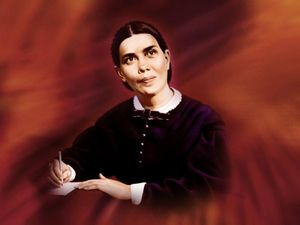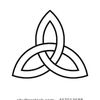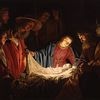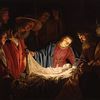14.9.2017 | 13:56
Hverju trśšu frumherjar Ašvent kirkjunnar um žrenninguna?
 Fyrir ašventista žį ętti žaš aš vera mjög fróšlegt aš vita hvernig frumherjar kirkjunnar sįu žrenninguna og hvernig žeir skildu ešli Gušs. Einnig er gott aš hafa hérna til hugar hvaš Ellen White sagši um frumherjana og grunn trśarsetningarnar sem kirkjan hafši en hśn sagši žetta:
Fyrir ašventista žį ętti žaš aš vera mjög fróšlegt aš vita hvernig frumherjar kirkjunnar sįu žrenninguna og hvernig žeir skildu ešli Gušs. Einnig er gott aš hafa hérna til hugar hvaš Ellen White sagši um frumherjana og grunn trśarsetningarnar sem kirkjan hafši en hśn sagši žetta:
"Ķ framtķšinni munu blekkingar af öllum toga koma upp og viš viljum traustan grunn til aš standa į. Viš viljum trausta stošir fyrir bygginguna. Ekki ein einasta stoš mį vera fjarlęgš frį žvķ sem Drottinn hefur set į fót. Óvinurinn mun koma meš falskar kenningar sem munu valda žvķ aš fólk yfirgefur trśna. Hvar getum viš fundiš öryggi nema žaš sé ķ žeim sannleika sem Guš hefur gefiš sķšustu fimmtķu įr.
(Ellen White, Review & Herald,May 25, 1905)
“In the future, deception of every kind is to arise, and we want solid ground for our feet. We want solid pillars for the building. Not one pin is to be removed from that which the Lord has established. The enemy will bring in false theories, such as the doctrine that there is no sanctuary. This is one of the points on which there will be a departing from the faith. Where shall we find safety unless it be in the truths that the Lord has been giving for the last fifty years?” (Ellen White, Review & Herald,May 25, 1905)
Sem sagt, grunninn sem var bśiš aš leggja įriš 1905 įtti aš haldast óbreyttur. Žaš žżšir ekki aš žaš mįtti ekki hrófla viš kennisetningunum, hśn var alveg skżr aš kirkjan įtti aš halda įfram aš rannsaka og uppgvöta meiri sannleika ķ Biblķunni en aš grunnurinn sem var bśiš aš leggja hafi veriš traustur og aš Guš sjįlfur hafi tekiš žįtt ķ aš bśa hann til. Žessi grunnur sem Ellen White vķsar til var ekki ķ samręmi viš žrennninguna, aš Guš sé ein vera meš žrjįr persónur.
Meš žetta ķ huga, skošum ašeins hvaš nokkrir af frumherjum kirkjunnar skrifušu um ešli Gušs og žrenninguna.
“Beloved, when I gave all diligence to write unto you of the common salvation, it was needful for me to write unto you and exhort you that ye should earnestly contend for THE faith which was once delivered unto the saints...” (Jude 3, 4) ...The exhortation to contend for the faith delivered to the saints, is to us alone. And it is very important for us to know what for and how to contend. In the 4th verse he gives us the reason why we should contend for THE faith, a particular faith; “for there are certain men,” or a certain class who deny the only Lord God and our Lord Jesus Christ... The way spiritualizers have disposed of or denied the only Lord God and our Lord Jesus Christ is first using the old unscriptural Trinitarian creed, viz., that Jesus Christ is the eternal God, though they have not one passage to support it, while we have plain scripture testimony in abundance that he is the Son of the eternal God.” — (James White, The Day Star, January 24, 1846)
“Paul affirms of the Son of God that he was in the form of God, and that he was equal with God. 'Who being in the form of God thought it not robbery to be equal with God.' Phil. 2:6. The reason why it is not robbery for the Son to be equal with the Father is the fact that he is equal... The inexplicable Trinity that makes the Godhead three in one and one in three, is bad enough; but that ultra Unitarianism that makes Christ inferior to the Father is worse. Did God say to an inferior, “Let us make man in our image?” — (James White, Review and Herald, November 29, 1877)
“We are told by those who teach the abolition of the Father's law, that the commandments of God mentioned in the New Testament, are not the ten, but the requirements of the gospel, such as repentance, faith, baptism and the Lord's supper. But as these, and every other requirement peculiar to the gospel, are all embraced in the faith of Jesus, it is evident that the commandments of God are not the sayings of Christ and his apostles. To assert that the sayings of the Son and his apostles are the commandments of the Father, is as wide from the truth as the old trinitarian absurdity that Jesus Christ is the very and Eternal God. And as the faith of Jesus embraces every requirement peculiar to the gospel, it necessarily follows that the commandments of God, mentioned by the third angel, embrace only the ten precepts of the Father's immutable law which are not peculiar to any one dispensation, but common to all.” — (James White, Review and Herald, August 5, 1852, p. 52)
“Here we might mention the Trinity, which does away the personality of God, and of his Son Jesus Christ, and of sprinkling or pouring instead of being “buried with Christ in baptism,” “planted in the likeness of his death:” but we pass from these fables to notice one that is held sacred by nearly all professed Christians, both Catholic and Protestant. It is, The change of the Sabbath of the fourth commandment from the seventh to the first day of the week.” — (James White, Review and Herald, December 11, 1855, p. 85)
The “mystery of iniquity” began to work in the church in Paul's day. It finally crowded out the simplicity of the gospel, and corrupted the doctrine of Christ, and the church went into the wilderness. Martin Luther, and other reformers, arose in the strength of God, and with the Word and Spirit, made mighty strides in the Reformation. The greatest fault we can find in the Reformation is, the Reformers stopped reforming. Had they gone on, and onward, till they had left the last vestige of Papacy behind, such as natural immortality, sprinkling, the trinity, and Sunday-keeping, the church would now be free from her unscriptural errors.” — (James White, Review and Herald, February 7, 1856, p. 148)
“The doctrine of the Trinity which was established in the church by the council of Nice A. D. 325. This doctrine destroys the personality of God and his Son Jesus Christ our Lord. The infamous, measures by which it was forced upon the church which appear upon the pages of ecclesiastical history might well cause every believer in that doctrine to blush.” — (J.N. Andrews, Review and Herald, March 6, 1855)
“My parents were members of long standing in the Congregational church, with all of their converted children thus far, and anxiously hoped that we would also unite with them. But they embraced some points in their faith which I could not understand. I will name two only: their mode of baptism, and doctrine of the trinity. My father, who had been a deacon of long standing with them, labored to convince me that they were right in points of doctrine... Respecting the trinity, I concluded that it was an impossibility for me to believe that the Lord Jesus Christ, the Son of the Father, was also the Almighty God, the Father, one and the same being. I said to my father, “If you can convince me that we are one in this sense, that you are my father, and I your son; and also that I am your father, and you my son, then I can believe in the trinity.” — (Joseph Bates, The Autobiography Of Elder Joseph Bates, 1868, p. 204)
“BRO. WHITE: The following questions I would like to have you give, or send, to Bro. Loughborough for explanation. W. W. Giles. Toledo, Ohio.
QUESTION 1. What serious objection is there to the doctrine of the Trinity?
ANSWER. There are many objections which we might urge, but on account of our limited space we shall reduce them to the three following: 1. It is contrary to common sense. 2. It is contrary to scripture. 3. Its origin is Pagan and fabulous. J.N. Loughboroug
“The Bible says nothing about the trinity. God never mentions it, Jesus never named it, the apostles never did. “Now men dare to call God, Trinity, Triune, etc.” — (D.M. Canright, Review and Herald, August 29th 1878, ‘The Personality of God’)
“Turning to the New Testament, we find the same doctrine taught just as plainly as in the Old. Neither Moses nor the prophets ever set forth the unity of God more strongly than Jesus himself. He taught it and reiterated it many times. Thus he says: 'The first of all the commandments is, Hear, O Israel: The lord our God is one Lord; and thou shalt love the Lord thy God with all thy heart, and with all thy soul...And the scribe said unto him, Well, Master, thou hast said the truth; for there is one God; and there is none other but he.' Mark 12:29-32. “The scribe said, 'There is one God, and there is none other but he.' To this declaration Jesus assented. 'And this is life eternal, that they might know thee the only true God, and Jesus Christ, whom thou has sent.' John 17:3 Jesus says his Father is the only true God. But Trinitarians contradict this by saying that the Son and Holy Ghost are just as much the true God as the Father is... [1 Cor. 8:4-6 quoted] “Says the great apostle, 'There is none other God but one,' and 'there is but one God, the Father, of whom are all things.' He tells us who this one God is. It is not the Holy Ghost; it is not Jesus Christ, but it is the Father. Gal. 3:20; 1 Tim. 1:17.
Žaš er hęgt aš tķna svo mikiš til en lęt žetta duga ķ bili. Žaš er aš minnsta kosti alveg skżrt aš žeir fjöllušu mikiš um žetta og hreinlega óhugsandi aš Ellen White hefši ekki mótmęlt ef aš žetta var rangt og hśn var raunverulega spįmašur Gušs.
Meginflokkur: Trśmįl og sišferši | Aukaflokkur: Trśmįl | Breytt 25.9.2017 kl. 14:33 | Facebook
Um bloggiš
Mofa blogg
Fęrsluflokkar
- Bloggar
- Bækur
- Dægurmál
- Ferðalög
- Fjármál
- Fjölmiðlar
- Heilbrigðismál
- Heimspeki
- Íþróttir
- Kjaramál
- Kvikmyndir
- Lífstíll
- Ljóð
- Löggæsla
- Mannréttindi
- Matur og drykkur
- Menning og listir
- Menntun og skóli
- Samgöngur
- Sjónvarp
- Spaugilegt
- Spil og leikir
- Stjórnmál og samfélag
- Sveitarstjórnarkosningar
- Tónlist
- Trúmál
- Trúmál og siðferði
- Tölvur og tækni
- Umhverfismál
- Utanríkismál/alþjóðamál
- Vefurinn
- Viðskipti og fjármál
- Vinir og fjölskylda
- Vísindi og fræði
Tenglar
Kristnar sķšur
Żmislegt
Sköpun/žróun
Sķšur sem fjalla um sköpun/žróun
- Detecting Design
- UnCommon descent Blogg sķša William Dembski um vitręna hönnun
- Creation-Evolution Headlines Sķša sem fjallar um fréttir tengdar sköpun žróun
- EvolutionNews Sķša sem fjallar um fréttir sem tengjast Vitsmunahönnun
Bloggvinir
- Bergur Thorberg
- Birgirsm
- Brosveitan - Pétur Reynisson
- Bryndís Böðvarsdóttir
- Daníel Þór Þorgrímsson
- Davíð S. Sigurðsson
- Davíð Örn Sveinbjörnsson
- Daði Einarsson
- Dóra litla
- Eva
- Eygló Hjaltalín
- Friðrik Páll Friðriksson
- Georg P Sveinbjörnsson
- Gladius
- Gunnar Ingi Gunnarsson
- Gunnlaugur Halldór Halldórsson
- Guðni Már Henningsson
- Guðrún Sæmundsdóttir
- Guðsteinn Haukur Barkarson
- Gísli Kristjánsson
- Halldóra Hjaltadóttir
- Halldóra Lára Ásgeirsdóttir
- Hjalti Rúnar Ómarsson
- Hörður Finnbogason
- Hörður Halldórsson
- Inga Helgadóttir
- Ingibjörg
- Ingvar Leví Gunnarsson
- Ingvar Valgeirsson
- Janus Hafsteinn Engilbertsson
- Jens Sigurjónsson
- Jóhann Hauksson
- Jóhann Helgason
- Jóhannes Ólafsson Eyfeld
- Jón Hjörleifur Stefánsson
- Jón Ríkharðsson
- Jón Valur Jensson
- Jónatan Gíslason
- Júdas
- Kristin stjórnmálasamtök
- Kristinn Theódórsson
- Kristinn Theódórsson
- Kristinn Ásgrímsson
- Linda
- Mama G
- Morgunstjarnan
- Nonni
- Omnivore
- Predikarinn - Cacoethes scribendi
- Pétur Eyþórsson
- Ragnar Birkir Bjarkarson
- Ragnar Kristján Gestsson
- Ragnar Steinn Ólafsson
- Ragnheiður Katla Laufdal
- Róbert Badí Baldursson
- Rósa Aðalsteinsdóttir
- Rödd í óbyggð, kristilegt félag
- Röddin
- Rúnar Kristjánsson
- Sigurður Þórðarson
- Sigvarður Hans Ísleifsson
- Steinar Immanúel Sörensson
- Styrmir Reynisson
- Svanur Gísli Þorkelsson
- Sverrir Halldórsson
- TARA
- TARA ÓLA/GUÐMUNDSD.
- Theódór Norðkvist
- Tryggvi Hjaltason
- Tímanna Tákn
- Unknown
- Vefritid
- Viðar Freyr Guðmundsson
- gudni.is
- Ólafur Jóhannsson
- Þarfagreinir
- Þórdís Ragnheiður Malmquist
- Alexander Steinarsson Söebech
- Árni Karl Ellertsson
- BookIceland
- Elísa Elíasdóttir
- Fanney Amelía Guðjonsson
- Friðrik Már
- Gestur Halldórsson
- Guðjón E. Hreinberg
- Gunnar Ingvi Hrólfsson
- Gunnar Jóhannesson
- Hulda Þórey Garðarsdóttir
- Jens Guð
- Karl Jóhann Guðnason
- Kristinn Ingi Jónsson
- Lífsréttur
- Mathieu Grettir Skúlason
- Tómas Ibsen Halldórsson
- Valur Arnarson
- Viktor
- Vilhjálmur Örn Vilhjálmsson
Heimsóknir
Flettingar
- Ķ dag (25.4.): 1
- Sl. sólarhring: 1
- Sl. viku: 25
- Frį upphafi: 802783
Annaš
- Innlit ķ dag: 1
- Innlit sl. viku: 25
- Gestir ķ dag: 1
- IP-tölur ķ dag: 1
Uppfęrt į 3 mķn. fresti.
Skżringar






Athugasemdir
Žegar fjallaš eru svona alvarleg mįl eins og tślkun į orši Gušs, žį er vert aš hafa ķ huga, aš viš sem lesum slķkt erum Ķslendingar! Žess vegna tel ég aš žessi speki hafi fariš ofangaršs og nešan hjį lesendum! Žaš kostar sjįlfsagt tķma aš žżša, en er mikilvęgt, ef bošskapurinn er ętlašur Ķslendingum.
Siguršur Oddgeirsson, 14.9.2017 kl. 14:47
Góšur punktur Siguršur. Žvķ mišur žį hefur enginn žżtt žessi rit. Ég sé til hvort ég geti žżtt žetta, getur varla veriš svo mikil vinna og žó ég er ekki atvinnu žżšandi žį ętti ég aš geta gert žaš. Takk fyrir įbendinguna.
Mofi, 15.9.2017 kl. 16:02
Bęta viš athugasemd [Innskrįning]
Ekki er lengur hęgt aš skrifa athugasemdir viš fęrsluna, žar sem tķmamörk į athugasemdir eru lišin.